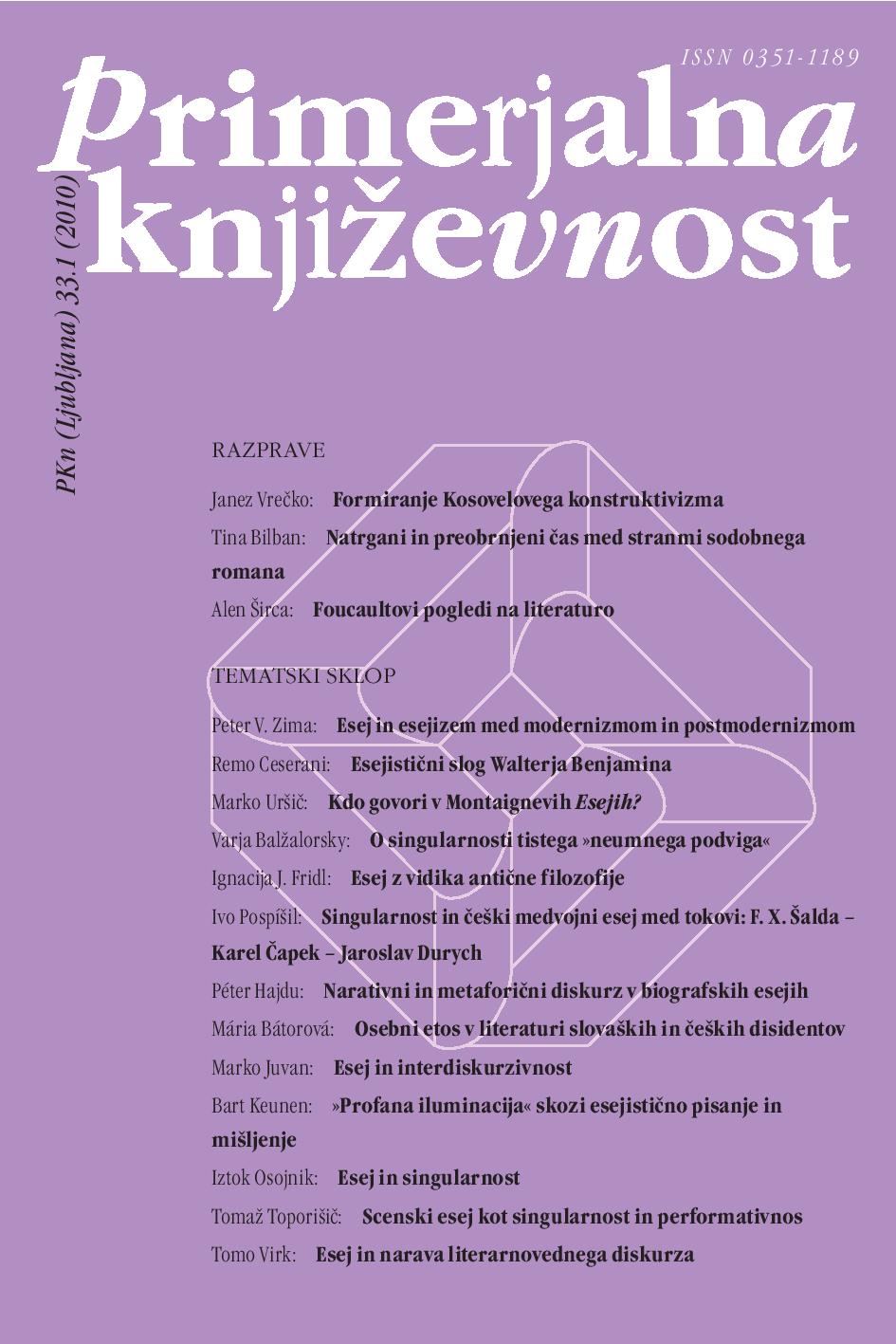Torn and Reversed Time on the Pages of the Contemporary Novel
Keywords:
literature and philosophy, modern novel, time, philosophy of time, Pavić, Milorad, Amis, Martin, comparative studiesAbstract
This article examines the problem of time in the novels Unikat (Unique Item) by Milorad Pavić and Time’s Arrow by Martin Amis. In both of them the examination of time determines not only the content elements but the outer structure of the novels as well. Literary storytelling is essentially based on elements from contemporary physical and philosophical theories. With help of postmodern elements, Pavić decomposes everything that is a priori absolute or real. The integral publication of his novel consists of one hundred different endings; the reader chooses among them. His literary interpretation of time is thus essentially connected with elements from quantum mechanics and post-structural philosophy. On the other hand, Amis’ playing with time opens existential and ethical problems. An inverse time arrow keeps him at a sufficient distance to relate the inhuman dimensions of the Second World War and at the same time makes some motifs more visible. To accomplish this, the connection with contemporary physical interpretations of time and cosmological models, often including the inverse time arrow, is the most important along with the specific literary approach. Amis’ attitude towards contemporary physics is thus essentially dual. On the one hand, he is very critical of physics, connecting it with contemporary self-confident progress and military technology, making possible the dimensions of the Second World War’s horror. On the other hand, he goes beyond this criticism by integrating physics as an essential element in his storytelling, making it possible to express horror and the absurd. This kind of dual attitude towards physics brings him near Heidegger’s philosophy after the turn. Pavić’s and Amis’ playing with time thus also represents the truth about (our) time and about ourselves as being essentially defined by being-in-time.References
Amis, Martin. Časovna puščica. Prev. Nina Grahek Križnar. Ljubljana: Cankarjeva založba, 1997.
Barbour, Julian. The End of Time. London: Phoenix, 2004.
Bell, John. Speakable and Unspeakable in Quantum Mechanics. Cambridge: Cambridge University Press, 1993.
Bilban, Tina. »Postmoderna zgodba o času: čas v horizontu sodobnega romana.« Emzin: čas 6.2 (2008): 105– 106.
Derrida, Jacques. Izbrani spisi. Prev. Uroš Grilc. Ljubljana: Študentska organizacija Univerze, 1994.
Einstein, Albert, Podolsky, Boris, Rosen, Nathan. »Can Quantum-Mechanical Description of Physical Reality Be Considered Complete?« Physical Review 47 (1935): 777–780.
Heidegger, Martin. »Vprašanje po tehniki.« Izbrani spisi. Prev. Ivan Urbančič. Ljubljana: Cankarjeva založba, 1967.
Kiefer, Claus. »Does Time Exist in Quantum Gravity?« http://www.fqxi.org/data/essay-contestfiles/Kiefer_fqx.pdf.
Lyotard, Jean-Francois. Postmoderno stanje. Ljubljana: Analecta, 2002.
Pavić, Milorad. Unikat. Beograd: Dereta, 2006.
Schrödinger, Ernest. »Die gegenwärtige Situation in der Quantenmechanik.« Naturwissenschaften 23 (1935): 807–849.
Strnad, Janez. Posebna teorija relativnosti. Ljubljana: Državna založba Slovenije, 1979.
Virk, Tomo. Moderne metode literarne vede in njihove filozofsko teoretske osnove. Ljubljana: Filozofska fakulteta Univerze v Ljubljani, Oddelek za primerjalno književnost in literarno teorijo, 2003.
– – – Strah pred naivnostjo. Ljubljana: Literarno-umetniško društvo Literatura, 2000.


